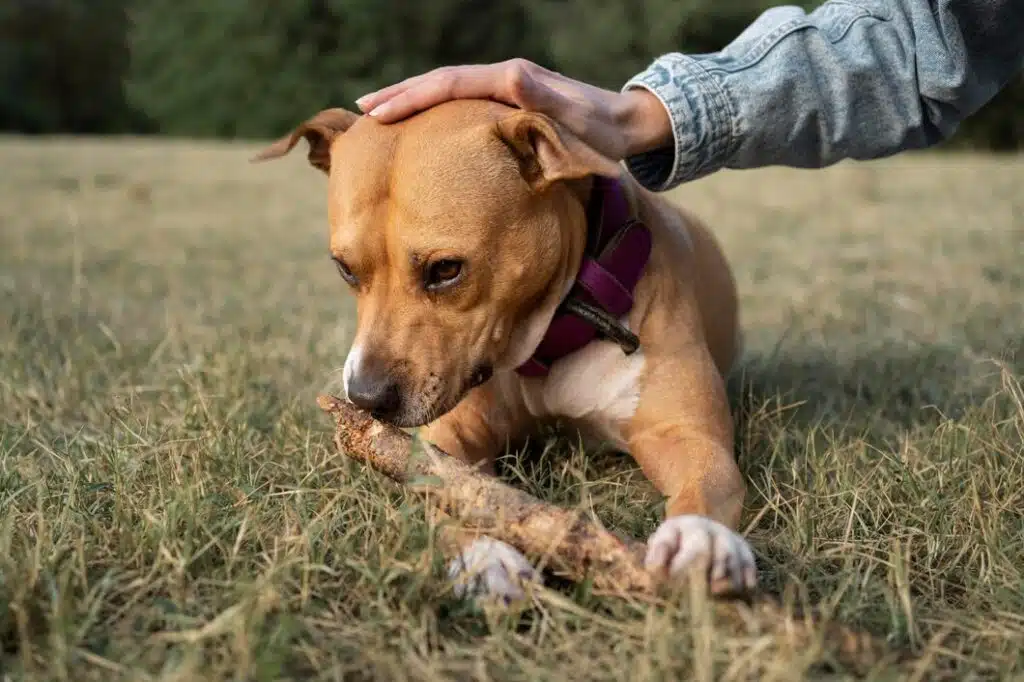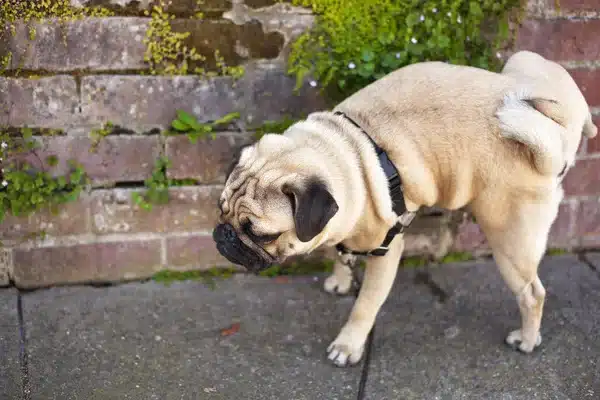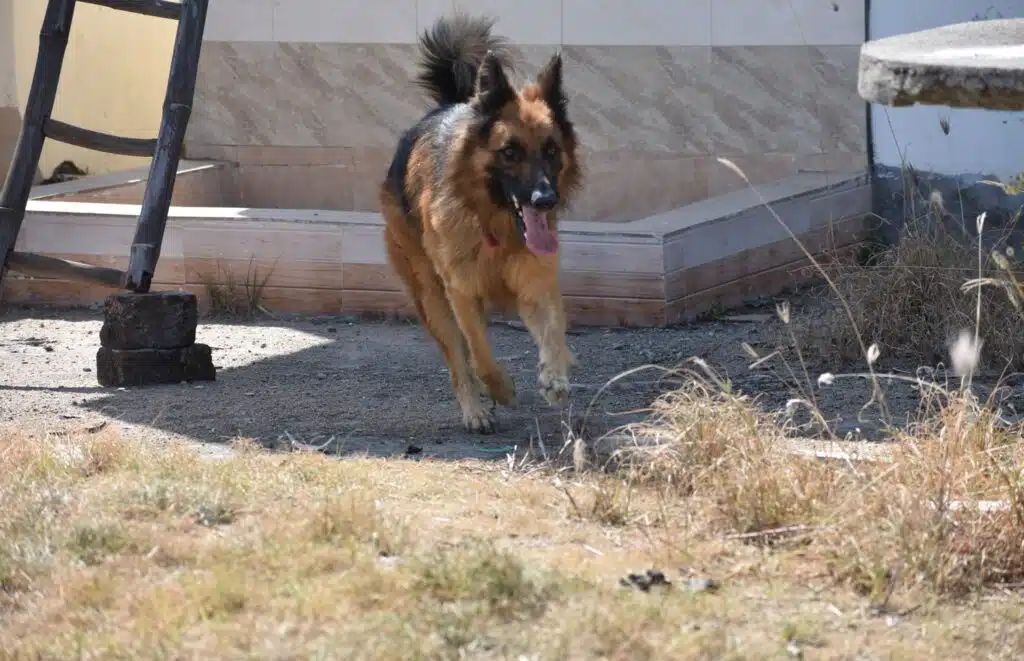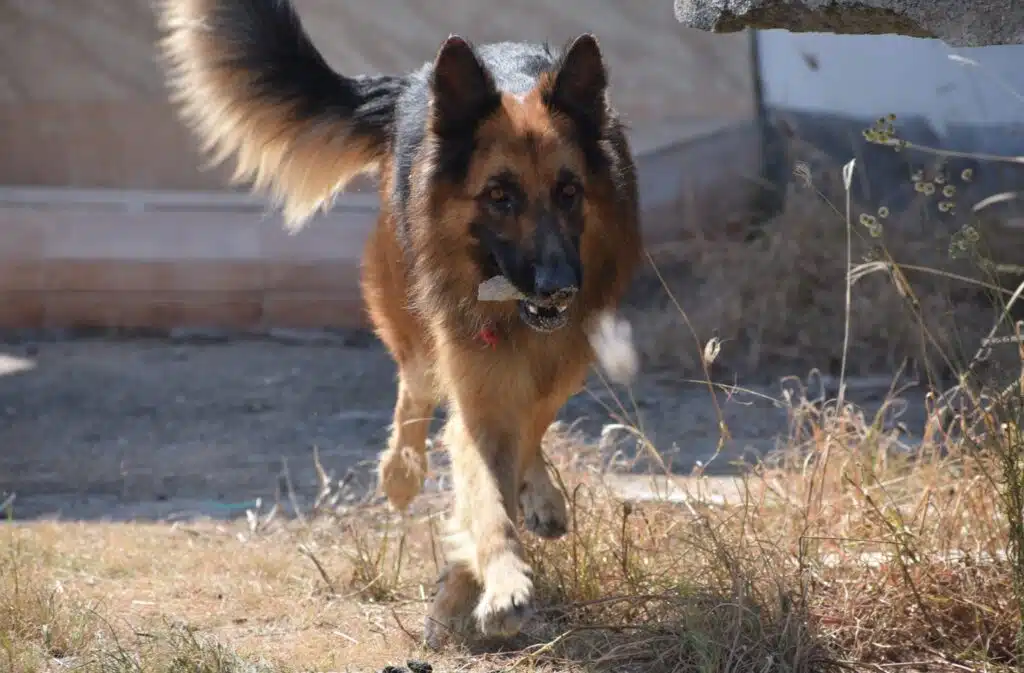Many dog owners like me find themselves puzzled when they notice that their dog licking soil especially after having food. If you’ve observed this behavior in your German shepherd or any other dog breeds, you’re not just alone but quite a few dog owners have noticed it.
Table of Contents
This stimulating habit can be attributed to multiple reasons that can start from natural instincts of dogs to nutritional deficiencies and psychological factors.
Understanding the Behavior

Based on my previous experience on this issue i had identified 4 major issues in terms of behavior of the dog for this soil licking behavior in dogs and here you go.
Natural Instincts in Dogs
Dogs have inherited a large number of behavioral instincts from their wild ancestors, so-called wolves. One of these instinctual behaviors is exploring their environment through licking and sniffing. Soil-licking can be an extension of this natural curiosity.
For centuries, wild canines have relied on their senses to detect food, identify territories, and recognize potential threats. For example dogs generally pee in the areas where they roam around to detect the path and come back to their home. Hence, your dog might be displaying characteristic behaviors of these ancestral Wolves.
Curiosity and Exploration
Dogs are naturally curious creatures. Throw a ball which passes from in front of them, their natural instinct will always make that dog chase the ball and catch it and also look at what it is!!
Dog licking soil could be their way of exploring their surroundings. The soil carries a multitude of scents and tastes, providing your dog with new sensory experiences. After eating, your dog’s heightened interest in their environment might lead them to sample the dirt as part of their exploration.
Other Dog Urine

As a dog owner, I have observed an instinct that my male German shepherd used to lick the area where another female street dog urinated. Not very sure if this is the right instinct but would like to bring it to the notice who is exploring the reasons behind this behavior.
Female dogs generally leave a different scent during periods and that makes male dogs lean more towards that place and as a natural instinct your dog may start licking the soil.
Imitating other birds and animals
The very strong possible reason for soil-licking could be imitating behaviors observed in other animals like pigeons, cats and other dogs which were seen in nearby areas. If your dog notices other animals, such as birds or other dogs, engaging with soil, they may try to imitate that behavior. This kind of social learning is quite common in pets and this could be the scenario why your dog might start licking soil out of the blue.
Nutritional Deficiencies
Nutritional deficiency generally due to carelessness or improper awareness of dog owner on how much quantity and quality of food to feed.
Lack of Essential Minerals
One of the most reasonable reasons behind a dog’s soil-licking habit is a lack of essential minerals (so called nutritional values that a dog must have) in their diet. Soil contains various minerals like calcium, sodium, iron, sulfur and magnesium, which dogs might instinctively seek if their bodies are deficient. If your dog is habitually licking soil, it’s worth considering if their diet meets all their nutritional needs.
Inadequate Diet
We sometimes assume that we have had fed our dog to his full stomach but as the dog grows, we see that the feed that we gave is not enough for them for the level of activity they have, especially when they are left in a ground off-leash. Dogs who roam around at an open pace will burn much more calories compared with dogs that are on leash, hence dogs tend to get this habit of licking the soil. This behavior is known as pica, where animals eat non-food items.
Diagnosing Nutritional Imbalance
To diagnose whether a nutritional imbalance is causing your dog to lick soil, look for other signs of deficiency such as lethargy, poor coat condition or hair loss during un season, or unusual eating habits and also sometimes a perfectly potty training also might give some accidents.
A visit to the vet can help determine if your dog needs a change in diet or additional supplements. Blood tests and a detailed dietary assessment can provide insights into what might be missing from your dog’s nutrition.
Medical Concerns
Medical conditions are highly predominant when we continuously ignore certain things like feeding indigestible food for dogs in a long term which may lead to certain complications which are discussed below.
Gastrointestinal Issues
Gastrointestinal issues are another common reason why dogs might lick soil and this condition generally arises when your dog reaches a proper adult stage that is from 9 months and above age.
Always try to make sure to avoid giving any human food to our dogs, sometimes there can be instances where we feed our home cooked mutton or chicken given to dogs in some emergency situations, please try to avoid those as these things will lead to their gastro problems.
Problems like indigestion, nausea, or upset stomach can lead a dog to seek relief by eating soil. The minerals and clay in the soil might provide a soothing effect on their digestive tract. If your dog displays this behavior frequently, gastrointestinal ailments might be at play.
Anemia and Other Blood Disorders
Anemia and other blood disorders are also one of the reasons that can trigger soil-licking behavior in dogs. Anemic dogs often search for iron and other minerals found in soil to compensate for their deficiencies.
Complete blood picture (CBP) of your dog is advised If your dog shows signs of fatigue, pale gums, or weight loss along with soil-licking. It could be indicative of anemia or another blood-related issue. Immediate veterinary attention is recommended in such cases.
Parasites and Infection
Parasites like hookworms and roundworms can cause nutritional deficits in dogs, leading them to lick soil. These parasites like ticks, fleas and other drain essential nutrients from their host, prompting the dog to seek out alternative sources of nutrition.
Soil, unfortunately, can also be a source of parasites, creating a vicious cycle. Regular deworming and check-ups are essential to prevent and treat such conditions.
| Age | Deworming Schedule |
| 3-12 weeks | Every 2 weeks |
| 3-6 months | Monthly |
| 6 months – 5 years | Every 3-6 months |
Psychological Factors
Psychological factors are directly proportional to the negligence or inappropriate time given to our dogs which may be lead to multiple behavioral problems which include.
Stress and Anxiety
Stress and anxiety can manifest in various ways in dogs, including soil-licking. If your German Shepherd is experiencing anxiety due to changes in their environment, separation from family members, or other stressors, they might exhibit this behavior as a coping mechanism.
I have a habit of leaving my dog on the terrace while I’m away from home, so that he gets a designated area to pee and also can freely roam around on the terrace.

In some instances i had to leave him for a few days like that while i was out of station, this triggered separation anxiety in my dog and ultimately left him to indulge in these kinds of soil licking activities.
Addressing the underlying stressors is crucial to alleviating such behaviors.
Attention-Seeking Behavior
Dogs crave attention and may resort to unusual behaviors like soil-licking to get it. If your dog notices that licking soil garners your immediate attention, they might continue doing it to keep you engaged.
I have a habit of talking on a mobile phone while I go for a walk with my dog. The more often i’m on call and when i couldn’t engage with my dog, this kind of behavior is raised in my dog which ultimately make me scold my dog or resist him to stop doing so.
Consistent and positive interaction with your dog can help mitigate this attention-seeking behavior.
Environmental Influences
Presence of Food Residues
Dogs raised inside a kennel and more often seen going for a walk inside the compound wall, where highest care is taken that no food residues are left over there.
The case will be completely different when we take our dog outside, left overs of food are commonly seen on street roads which cant be visible for us but dogs can fetch the smell of the those and gets attracted to those.
I have an instance where my dog swallowed a dry dead frog piece and tried to hide it. Ensuring a clean eating area can help reduce this behavior.
Soil Composition and Smell
Certain soil types might have appealing scents or tastes due to their composition. Soil rich in organic matter or fertilizers can be particularly enticing to dogs. Observing if your dog is attracted to specific areas can provide clues about this tendency.
This is sometimes not harmful, but our utmost care is always advised.
Seasonal Changes
Seasonal changes can also influence a dog’s behavior. During certain times of the year, the soil might have different scents or consistencies due to moisture levels, plant decay, or temperature changes. Your dog might be more inclined to lick soil during these periods, driven by the new sensory stimuli.
Solutions and Preventive Measures
Adjusting Diet and Supplements
Addressing any potential nutritional deficiencies is the first step in curbing soil-licking behavior. Consulting with a veterinarian to ensure your dog is on a well-balanced diet tailored to their specific needs is crucial. You might also consider adding supplements to their diet to fill any nutritional gaps.
Behavioral Training and Enrichment
Behavioral training can help mitigate soil-licking habits. Reward-based training methods, combined with positive reinforcement, can redirect your dog’s attention away from soil. Providing plenty of mental and physical enrichment, such as puzzle toys, agility training, and regular walks, can also keep your dog engaged and less likely to lick soil out of boredom.
Veterinary Consultation and Treatment
If you suspect that a medical issue is causing your dog to lick soil, seek veterinary consultation immediately. Your vet can conduct thorough examinations, including blood tests and stool samples, to diagnose and treat any underlying health problems. Regular veterinary check-ups are essential to maintaining your dog’s overall health and well-being.
Final Thoughts
While soil-licking might seem like a harmless or quirky behavior, it can be indicative of underlying issues that need addressing. By understanding the potential causes, from natural instincts and psychological factors to nutritional deficiencies and medical concerns, you can take steps to ensure your dog’s health and happiness.
For more detailed information on German Shepherd care and tips on how to address specific behavioral or health issues, visit Germanshepherddog.info. Our comprehensive resources are tailored to help you keep your German Shepherd in the best possible condition.

